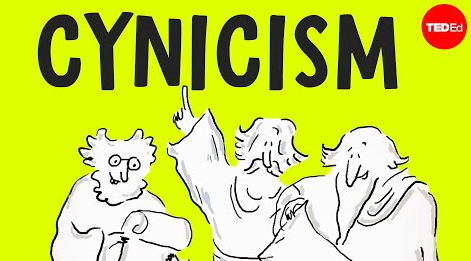In the 4th century BCE, a banker's son threw the city of Sinope into scandal by counterfeiting coins.
公元前4世纪,一位银行家的儿子让一座名叫锡诺普的土耳其城市陷入硬币造假的丑闻。
When the dust finally settled, the young man, Diogenes of Sinope, had been stripped of his citizenship, his money, and all his possessions.
最后尘埃落定时,这位年轻男子--锡诺普城的第欧根尼--被剥夺了公民权,以及所有的金钱与财产。
At least, that's how the story goes. While many of the details of Diogenes' life are shadowy, the philosophical ideas born out of his disgrace survive today.
至少故事里是这么说的。尽管第欧根尼生平的许多细节鲜为人知,但他羞耻的行为所孕育的哲学思想却留存至今。
In exile, Diogenes decided that by rejecting the opinions of others and societal measures of success, he could be truly free.
流放在外的第欧根尼断定,如果他能抗拒他人的评判以及社会对成功的标准,他便能真正获得自由。
He would live self-sufficiently, close to nature, without materialism, vanity, or conformity.
他将会过上自给自足、亲近自然的生活,而脱离物质崇拜与浮华虚荣,不再随波逐流。
In practice, this meant he spent years wandering around Greek cities with nothing but a cloak, staff, and knapsack
实际上,这意味着他花费了多年时间游荡于各个希腊城市,除了他的斗篷、拐杖和随身行囊之外不带任何东西,
outdoors year-round, forgoing technology, baths, and cooked food.
一年到头都待在户外,弃科技、洗浴和熟食于身外。
He didn't go about this new existence quietly, but is said to have teased passers-by and mocked the powerful, eating, urinating and even masturbating in public.
据说,他并没有悄悄地追求这种新的存在形式,而是取笑路人、嘲讽权贵,在众目睽睽之下进食、如厕,甚至自慰。
The citizens called him a kyon -- a barking dog.
别人都称他为狗--一只不停吠叫的狗。
Though meant as an insult, dogs were actually a good symbol for his philosophy -- they're happy creatures, free from abstractions like wealth or reputation.
这称呼即使本来是一种辱骂,但对于他的哲学思想来说,实际上是一个挺好的象征--狗是一种快乐的生物,不受财富或声誉这种抽象概念困扰。
Diogenes and his growing number of followers became known as "dog philosophers," or kynikoi, a designation that eventually became the word "Cynic."
第欧根尼,和他日益增加的追随者们后来以“狗哲人”,或犬的称呼而闻名,最终这个称呼也演变成了一个词语“犬儒”。
These early Cynics were a carefree bunch, drawn to the freedom of a wandering lifestyle.
这些早期的犬儒主义者无拘无束,被徘徊流浪的生活方式所吸引。
As Diogenes' reputation grew, others tried to challenge his commitment.
随着第欧根尼名声大噪,人们也开始试着挑战他对自己思想的坚持。
Alexander the Great offered him anything he desired.
亚历山大大帝曾承诺给予他想要的一切。
But instead of asking for material goods, Diogenes only asked Alexander to get out of his sunshine.
但第欧根尼并没有向他提出任何物质需求,而是让亚历山大大帝挪开,别挡着他的阳光。
After Diogenes' death, adherents to his philosophy continued to call themselves Cynics for about 900 years, until 500 CE.
第欧根尼逝世后,其哲学思想的追随者们在之后的大约900年间,直到公元500年,仍自称为犬儒主义者。
Some Greek philosophers, like the Stoics, thought everyone should follow Diogenes' example.
一些希腊哲学家,例如斯多葛学派学者,认为每个人都应该以第欧根尼为榜样。
They also attempted to tone down his philosophy to be more acceptable to conventional society -- which, of course, was fundamentally at odds with his approach.
他们也尝试调整并缓和第欧根尼的哲学思想以适应大众,从而使得传统社会更能接纳这一思想--当然,这与第欧根尼的方式本质上是相矛盾的。
Others viewed the Cynics less charitably.
其他人对犬儒主义的态度则没那么包容。

In the Roman province of Syria in the 2nd century CE, the satirist Lucian described the Cynics of his own time as unprincipled, materialistic, self-promoting hypocrites,
公元2世纪,在古罗马的叙利亚行省,讽刺作家琉善曾将他那个时代的犬儒主义者描述为不讲原则、贪图享乐,自我标榜的伪君子,
who only preached what Diogenes had once actually practiced.
他们只宣扬第欧根尼实践过的东西。
Reading Lucian's texts centuries later, Renaissance and Reformation writers called their rivals cynics as an insult
几个世纪后,文艺复兴和宗教改革时期的作家阅读了琉善的文字,将他们的对手称为犬儒主义者,以此羞辱他们,
meaning people who criticized others without having anything worthwhile to say.
说他们只是在批判别人,而自己却没能发表任何有价值的言论。
This usage eventually laid the groundwork for the modern meaning of the word "cynic:"
这种说法后来为“犬儒主义者”这个词的现代释义奠定了基础:
a person who thinks everyone else is acting out of pure self-interest, even if they claim a higher motive.
一个人认为,即便其他人声称自己有更高尚的动机,他们都是根据个人利益行事的。
Still, the philosophy of cynicism had admirers, especially among those who wished to question the state of society.
不过,犬儒主义的哲学思想仍旧有其拥护者,尤其是那些对社会状况心存质疑的人。
The 18th-century French philosopher Jean-Jacques Rousseau was called the "new Diogenes" when he argued that the arts, sciences, and technology, corrupt people.
18世纪法国哲学家让-雅克·卢梭因主张艺术、科学和科技会使人堕落,而被称为“新第欧根尼”。
In 1882, Friedrich Nietzsche reimagined a story in which Diogenes went into the Athenian marketplace with a lantern, searching in vain for a single honest person.
在1882年,弗里德里希·尼采重构了一个故事,在原本的故事里,第欧根尼提着灯前去雅典市场,徒劳地寻找一个真正诚实的人。
In Nietszche's version, a so-called madman rushes into a town square to proclaim that "God is dead."
在尼采版本的故事中,一个所谓的疯子冲进小镇广场,向大家宣告:“上帝死了。”
This was Nietzsche's way of calling for a "revaluation of values,"
这是尼采呼吁“重新审视价值观”的方式,
and rejecting the dominant Christian and Platonic idea of universal, spiritual insights beyond the physical world.
他也以此抗拒基督教派和柏拉图派的主导思想对超越物质世界的、客观唯心主义的认知。
Nietzsche admired Diogenes for sticking stubbornly to the here-and-now.
尼采一直以来都很欣赏第欧根尼对当下实际的固执与执着。
More recently, the hippies of the 1960s have been compared with Diogenes as counter-cultural rebels.
更近些时,20世纪60年代的嬉皮士,作为一种逆文化的反叛者,被人们拿来与第欧根尼进行比较。
Diogenes' ideas have been adopted and reimagined over and over again.
第欧根尼的思想不断被采用、重构。
The original cynics might not have approved of these fresh takes:
最初的犬儒主义可能不会允许这些新兴行为:
they believed that their values of rejecting custom and living closely with nature were the only true values.
他们相信,自己拒绝世俗习惯并亲近自然的价值观,是唯一真实的价值观。
Whether or not you agree with that, or with any of the later incarnations, all have one thing in common: they questioned the status quo.
不论你是否同意这个观点,或是任何后来的衍生学说,它们都有一个共同之处:它们质疑现状。
And that's an example we can still follow: not to blindly follow conventional or majority views, but to think hard about what is truly valuable.
而这仍是一个值得我们学习的榜样:不要盲从传统或大众思想,而是认真思考,真正的价值所在。













